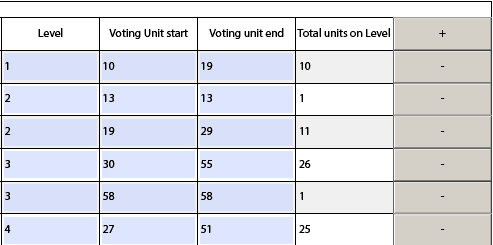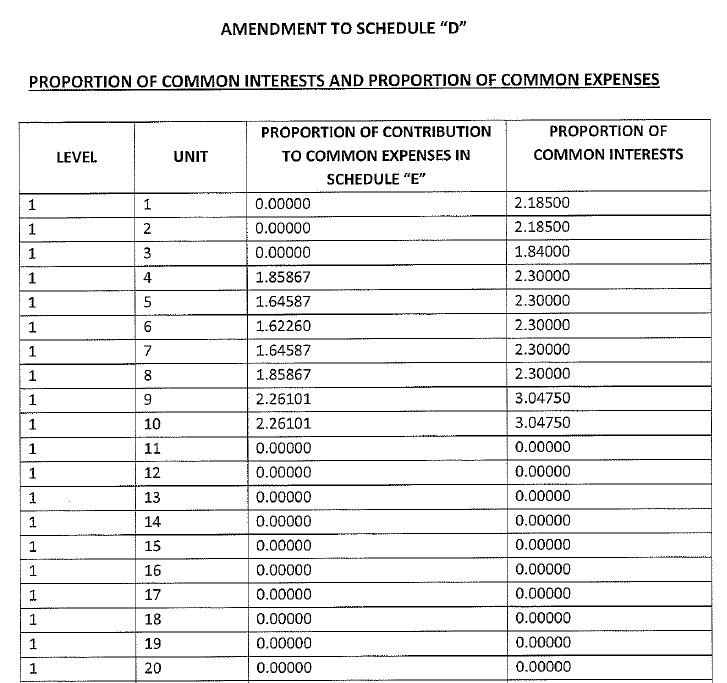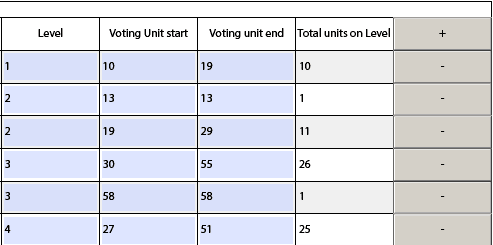Filing Requirements
File a Notice of Change
Condo corporations must file a notice of change with CAO when there is a change or correction to information already filed in a condo return or a previously submitted NOC.
Notice questions
Several notice questions must be answered and reported to CAO if your condo’s property status has changed. Additional supporting documentation about the property change will also need to be provided to CAO. Contact Us for more details.
See below for helpful details on what these questions mean:
This question asks if the condo corporation has sent a notice to register the termination of the corporation. The termination in this instance would have been approved by owners’ consent under section 122 of the Condo Act, or as the result of substantial damage to the corporation’s property under section 123.
Section 122 termination
- A condo corporation may terminate under section 122 of the Condo Act if:
- At least 80 per cent of unit owners vote in favour of its termination
- At least 80 per cent of those who have registered claims against the property consent to the termination in writing. The claims must have been created after the property was registered as a condo corporation.
A registered claim is an interest in property, such as a lien, that a third party has registered with the Land Registry Office.
- The corporation must then register a notice of termination with the LRO, signed by authorized officers of the corporation, terminating the government of the property by the Condo Act. The notice must be submitted using the mandatory form.
Section 123 termination: Substantial damage
- When a condo corporation terminates under section 123, it means that there was substantial damage to its property which initiated the termination of the government of the property by the Condo Act.
- For this type of termination to occur:
- The condo board first must have at least two unaffiliated and qualified persons estimate the property damage within 30 days of the damage occurring;
- The board must then determine whether the damage is substantial based on the estimates
- The board must then give the owners a notice of their determination, which must specify that the owners have the right to requisition an owners’ meeting under section 46 of the Act
- Owners of at least 80 per cent of the units must vote in favour of the termination
- The board must register a notice terminating the government of the property by the Condo Act.
- Substantial damage is defined in section 123 (2) as damage where:
- The cost of repairs is estimated to be equal to or greater than 25 per cent of the cost of replacing all the buildings and structures on the condo’s property
Question two asks whether the condo corporation has sold the property and therefore terminated the corporation under section 124 of the Condo Act. For the sale to proceed, the owners would have voted in favour of it. After the sale, certain required documents would have been delivered to the purchaser.
Section 124: Termination due to sale of the property
- If a condo corporation sells all or part of its property in accordance with section 124 of the Condo Act, that property ceases to be governed by the Act.
- For termination to occur:
- At least 80 per cent of unit owners must have voted in favour of the sale
- At least 80 per cent of those who have registered claims against the property—those created after the property was registered as a condo corporation—must consent to the termination in writing
- A claim is a legal right against the value of a piece of property by someone other than the property owner. Common claims examples are a mortgage on a home or a lien against a condo unit.
- If exclusive use common elements are to be sold, owners with designated use of those common elements must consent in writing
- The condo board must deliver certain documents to the purchaser when a sale takes place, which must be signed by authorized officers of the corporation and include:
- A deed—a legal document which transfers ownership of the property to the new owner
- A mandatory certificate form which states that the persons described above, who are required to vote in favour of the sale or consent to the sale in writing, have done so
Question 3 asks whether the condo corporation received a notice of intention from the government to convert all or a portion of the corporation’s property, for public use.
What is expropriation?
- Expropriation means an expropriating authority takes land without the consent of the owner by exercising its statutory powers to do so.
For example: A municipality seeks to build a road on land currently occupied by residential properties or other private land. In this scenario, the municipality may seek to expropriate—take ownership of the land—without the consent of the owners.
What is a notice of intention to expropriate?
- For an expropriation of land to occur under section 6 and section 4 of the Expropriations Act, the expropriating authority must apply for approval and provide notice by:
- Serving the owner a notice of its intention to expropriate the land
- Publishing the notice in a local newspaper where the land is situated for three consecutive weeks
- The owner of the land may seek a hearing at the Ontario Land Tribunal under section 6 and section 7 of the Act.
- After the hearing, the OLT produces a report and the approving authority makes a decision to either fully approve or deny the expropriation, or approve the expropriation with modifications under section 8 of the Act.
Question 4 asks whether the condo corporation applied to or received an order from the Superior Court of Justice to terminate the corporation under section 128 of the Condo Act.
Section 128 termination
- Under section 128, the following may make an application to the SJC for an order to terminate the government of the property by the Condo Act:
- The condo corporation itself
- An owner in the condo corporation
- A person with an encumbrance against a unit and common interest
An encumbrance is a right to or interest in land held by third-persons and not by the owner of the land. Examples include a mortgage or lien.
- The SCJ may make an order to terminate a corporation if it is of the opinion that the termination would be just and equitable, considering the:
- Scheme and intent of the Condo Act
- Probability of unfairness to the owners if the court does not order termination
- Probability of confusion and uncertainty in the affairs of the corporation or the owners if the court does not order termination
- Best interests of the owners
Question 5 asks whether the condo corporation has been notified that an individual applied to the court, or any other legal action, for an order to terminate the corporation under section 128 of the Condo Act.
Section 128 termination
- Under section 128 of the Act, the following may make an application to the Superior Court of Justice for an order to terminate the government of the property by the Condo Act:
- The condo corporation itself
- An owner in the condo corporation
- A person having an encumbrance against a unit and common interest.
An encumbrance is a right to or interest in land held by third-persons and not by the owner of the land. Examples include a mortgage or lien.
- Under section 128 (2), the SCJ may make an order to terminate a condo corporation if it is of the opinion that the termination would be just and equitable, considering the:
- Scheme and intent of the Act
- Probability of unfairness to the owners if the court does not order termination
- Probability of confusion and uncertainty in the affairs of the corporation or of the owners if the court does not order termination
- Best interests of the owners
Question 6 asks whether the condo corporation has been notified that the landowner applied to the Superior Court of Justice for an order to terminate the lease of the land under section 173 of the Condo Act.
- Leasehold condominiums may also terminate under section 173 of the Condo Act. However, the landowner may only terminate the leasehold interests in all the units of the condo if they are granted a court order to do so.
- The landowner must apply to the SJC for an order terminating all the leasehold interests, and the condo corporation must receive notice of from the landowner.
Question 7 asks whether the condo corporation has been notified by the landowner of their intention to not renew the lease of the land under section 174 of the Condo Act.
- Leasehold condo corporations do not own the land they exist on but have a leasehold interest in the land for a term ranging between 40 to 99 years.
- The leasehold interests in the units of the corporation expire at the end of the term.
- At least five years before the end of this term, the landowner must give the condo corporation one of the following written notices:
- Notice of intention to renew all the leasehold interests
- Notice of intention not to renew all the leasehold interests.
- The corporation must give all unit owners a copy of the notice sent by the landowner.
Question 8 asks whether the owners voted to terminate the lease of the land and whether the landowner has been notified under section 174 of the Condo Act.
- Leasehold condo corporations do not own the land they exist on but have a leasehold interest in the land for a term ranging between 40 and 99 years.
- The leasehold interests in the units of the corporation expire at the end of the term.
- At least five years before the end of this term, the landowner must give the condo corporation one of the following written notices:
- Notice of intention to renew all the leasehold interests
- Notice of intention not to renew all the leasehold interests.
- The corporation must give all unit owners a copy of the notice sent by the landowner
- Under section 174 (6), if the owners object to the renewal and want the leasehold interests not to be renewed, 80 per cent of the unit owners must vote against the renewal.
And here’s an explanation of common terms found in mandatory questions
A condo corporation may cease to be a corporation under certain circumstances, known as termination. When this happens, all or part of the corporation’s property is no longer governed by the Condo Act. Although rare, terminations do sometimes occur. There are several ways that a condo corporation may terminate:
- Unit owners consent to the termination
- Substantial damage to the property occurs
- Sale of all or part of the property
- All or part of the property is expropriated
- The Superior Court of Justice makes an order that the property be terminated
Landowner applies to the SCJ for an order terminating a leasehold condo corporation
Expropriation, under the Expropriations Act means an expropriating authority—for example, a municipality— has taken land without the consent of the owner by exercising its statutory powers to do so.
Example: A municipality seeks to build a road on land currently occupied by residential properties or other private land. In this scenario, the municipality may seek to expropriate—take ownership of the land—without the consent of the owners.
The effective date is when the change or event described in the question took place. The date only needs to be provided if you answer yes to a notice question.
There are two broad categories of condo corporations: freehold and leasehold. The major difference between the two is who owns the land that the condo corporation occupies.
In a leasehold condominium, the corporation does not own the land that it exists on. Instead, the land is leased from the landowner for a certain period. Leasehold condo corporations are less common than freehold.
When condo owners buy their unit in a leasehold condominium, they buy a leasehold interest in the units and common elements, but do not own the land. The Condo Act treats leasehold condos much like freehold condos, but with some key differences:
- Common expenses fees that unit owners pay to the corporation includes a portion of the rent that must be paid to the landowner
- If the lease of the land expires, the condo owner’s right to occupy the unit is automatically terminated.
Leasehold condo corporations do not own the land that they exist on. A “lessor” is the owner of the land, defined under section 1 of the Condo Act as the person who owns the freehold estate in the land described in the condominium corporation’s description.
Special Notice of Change
To ensure the accuracy of the data on our Condo Registry and protect consumers, some information requires a Special Notice of Change be submitted to and reviewed by CAO before it can be updated. In many of these instances, a change may also result in changes to the Annual Assessment Fee a condo corporation must pay to CAO.
You can use this form to signal any important changes to:
- Land Registry Office registration date of the condo corporation
- Number of units or voting units of the condo corporation
- Unit information changes for phased condo corporations
- Municipal address of the condo corporation
Once processed, these changes appear on the condo corporation’s profile in the condo registry.
FAQs
The registration date may affect the amount of the condo corporation’s assessment fee depending on the change.
You may be required to pay additional fees if the registration date is earlier than initially reported. You will receive a credit in your next invoice if the opposite is true.
The number of voting units is used to calculate a condo corporation’s annual assessment fee. You may be required to pay additional fees through an updated invoice that must be paid within 30 days if the corporation’s voting units increase. If the opposite is true, you will be credited the difference in your subsequent invoices.
You can locate this date on the first page of your condo corporation’s declaration. If your corporation was registered with the Land Registry Office on or before Sept. 1, 2017, you should enter that date. If it was registered after, you can enter the date as shown in your declaration.
No. The current version of the special notice of change form has been required since Oct. 14, 2022. If an older version is submitted, you will be asked to resubmit using the updated form.
Amendments to Schedules C and D generally indicate the number and types of units in each phase. Reconciling requires that sequences of units be added in batches for each level. If you need to add a single unit to a phase, you must do so in a separate entry as shown below. If there is a break in the sequence, you must start a new entry as well.
Use the auto-calculated ‘Total Units on Level’ figures to reconcile the total number of voting units. A message will ask you to review the information if the totals do not match.
Example 1 – Schedule C:
“Boundaries of the residential units: Being units 10 to 19 inclusive on Level 1; Units 13, and 19 to 29 inclusive on Level 2; Units 30 to 55 inclusive, and unit 58 on Level 3; Units 27 to 51 inclusive on Level 4.”
The user added 10 units to Level 1, one unit in Level 2 and a further 11 units to Level 2. Each of these entries must be recorded separately. Two entries must be entered for level two because unit 13 is not in sequence with units 19 to 29.
The completed table will look like this:

Example 2 – Schedule D:

The user looked at Schedule D to find a list of units and identified that units 9 to 20 needed to be added. Units 9 and 10 are voting units and 11 to 20 are parking units.
The completed tables in this case will look like this:

The user must have full access permissions on the condo corporation’s CAO profile. Directors holding president or secretary roles automatically have full access. Other directors, officers, or authorized representatives can be added or edited if they need access.
A special notice of change must be filed with CAO to update or correct a condo corporation’s municipal address, which will then be reflected on the corporation’s Condo Registry page.
Go to View Returns History in your CAO account to download the PDF. You can also see which invoices are paid or unpaid and which returns filings are outstanding.